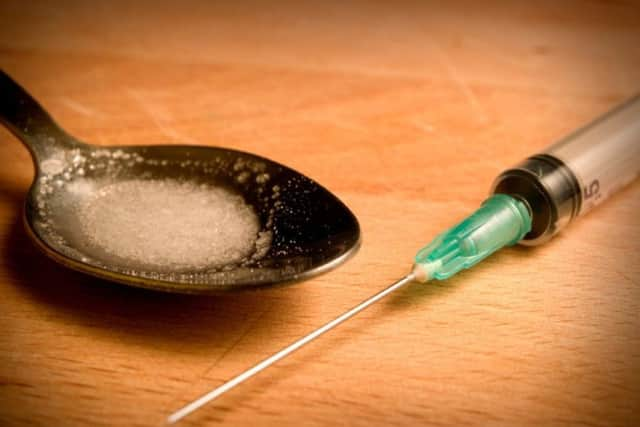Scotland’s drug death crisis demands tough love – Bill Jamieson
It has long been one of the comforts of life in Scotland that over recent decades life expectancy has been rising and on general measures of health and well-being, we have been on an improving trend.
But these can no longer be counted on. Life expectancy in parts of Scotland has stalled and is falling. We might have thought that the drug addiction death toll in Scotland, now at a horrific annual total of 1,187, was an isolated total, with little impact on general measures of health. That is no longer so. The figures show a staggering 27 per cent increase on a year earlier, the largest number of drug-related deaths in Scotland since figures began in 1996 and more than double the figure for 2008. Far from Scotland being viewed as an enviable social model, our figure for drug-related deaths is not just the worst in the UK – fatalities are running three times the UK level and higher than reported by any other EU country.
Advertisement
Hide AdAdvertisement
Hide AdThe image broadcast across the world’s media this week is one of a country with a most serious problem and, by many accounts, likely to get worse before improvement sets in. Health experts and social care workers may be divided on the best course of action – from de-criminalisation to a massive increase in rehabilitation and support services. But they are united in one response: the drug addiction problem is deep-seated, with multiple causes and will take prolonged action before improvement can be looked for.


That should not belittle the dedication and professionalism of frontline social care staff and certainly not the many heartening stories of recovery achieved by addicts who have succeeded in turning their lives around, providing inspiration and hope. Were there obvious and agreed causations for our drug death toll, the policy response could be that much more coherent and effective. But with every likely causation, there are exceptions that challenge conventional wisdom.
A common explanation, for example, is multiple deprivation. That certainly seems to ring true when we look at the areas worst affected. The NHS Board areas with the most drug-related deaths in 2018 were Greater Glasgow & Clyde – 394 fatalities or 33 per cent of the total. But Lothian region, with prominent areas of affluence, also scores highly, with 152 fatalities – 13 per cent.
And ‘multiple deprivation’ can hardly be cited when seeking to explain how drug abuse is so evident in financial centres such as the City of London where cocaine is seen as a socially acceptable recreational drug.
Others cite rising prices for tobacco and alcohol as contributory factors. More widespread is the call for more control centres and greater provision of the substitute methadone. But one of the most disheartening findings is that methadone has been found among the cocktail of drugs taken by many addicts.
Decriminalisation has been close to the top of the agenda of policy responses. But aside from the moral objections to a permissive tolerance of a pathway that would lead to greater problems of addiction, there are legal and regulatory problems.
A predictable response from the SNP administration is a call for ‘more powers’. Pete Wishart MP, chair of the Westminster Scottish Affairs Committee, says the figures “show just how severely the UK Government’s current drugs policy is failing the people of Scotland”. Its report, setting out “strong recommendations on what the UK Government should be doing to prevent the loss of further life in Scotland”, is expected in early autumn.
But the oral hearings have already raised some searching questions on policy here – and the complexity of the solution. Labour MP Hugh Gaffney quizzed the Lord Advocate as to why some of those dying are people who are on treatment. “When people are getting treatment and still dying, that worries me... are the Scottish Government looking at this?”
Advertisement
Hide AdAdvertisement
Hide AdOther members, Paul Masterson MP to the fore, questioned the administration of the Misuse of Drugs Act and how the system of diversion to other agencies and warnings, rather than a straight-line prosecution, was working. “Is it possible”, asked one, “that every incident to do with the possession of drugs could be diverted into one of these schemes? That would be a de facto decriminalisation, if I can put it that delicately.” And how are major drug suppliers dealt with once identified? Senior police officers, including the assistant chief constable, told the committee “offences that major drug suppliers are charged with do not reflect the harm caused by their action, particularly the deaths of those who use drugs”.
Some might argue that where traffickers were supplying a cocktail of drugs resulting in death, this might constitute manslaughter. But as the Lord Advocate pointed out, prosecutions can only proceed if there is a provable causal link between actions and a homicide. For all that more frontline support is needed to help addicts, I cannot help but feel we have reached a point at which ‘tough love’ is needed. And that toughness needs to be more evident in the prosecution and sentencing of drug traffickers, small or large. Areas of ambiguity also need to be clarified – for example, that possession can be overlooked where drug users say they are en route to a recovery facility. And the dispensing of methadone needs to be critically re-examined given the evidence of user abuse.
I do not pretend that rehab is a quick or easily provided solution. It involves time and resource. But a concentrated programme such as the Minnesota Method is often what it takes to set addicts on the road to recovery.